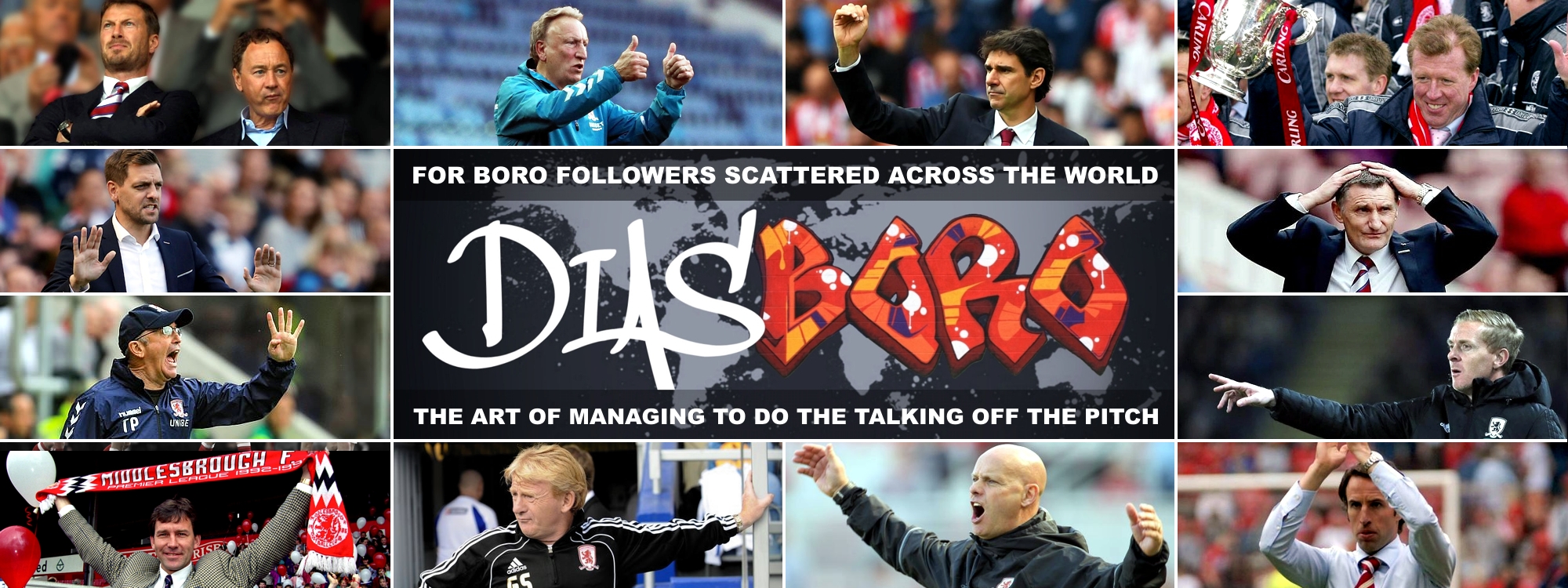Regardless of what happens in the play-offs, the Boro hierarchy are once again in a great position to secure the club’s future. Simon Fallaha discusses how it might be achieved
A hugely successful manager can be the best and worst thing to happen to any football club.
Am I being controversial? Maybe. But in my view, it definitely rings true. How often, in this beautiful game of ours, have we, as fans, put the manager on a pedestal only to destroy him before he and we know it? Or how frequently have clubs, after enjoying years or maybe even decades of reaching rarely attainable or previously unattainable heights under a certain manager, been left not quite knowing where we’re going after he departs?
I wonder if the Arsenal fans who spent years clamouring for Arsene Wenger’s exit are contemplating what structure their club will have in place now. Manchester United, as we know, have tried three managers since Sir Alex Ferguson departed and are nowhere near finding themselves at the top in quite the same way again.
With Wenger and Ferguson, and Don Revie, you had managers creating an enduring identity, their own family within the family of the club.
As James Corbett has argued, Revie changed the face of English football by being a “confidant to the players, psychologist, social secretary, kit designer, commercial manager, PR flak, dietician and all-encompassing ‘boss’ of his team”.
Revie’s Leeds were revolutionary, even if Brian H. Clough may have thought of Revie’s “family” as having more in keeping with the mafia than Mothercare, but that’s for another time.
Perhaps more significantly, much of what Revie did was carried forward to Boro when Jack Charlton became our manager. The white band that Charlton initiated is still iconic and the heroes of the 1973-74 side are still fondly spoken of today.
With all silver linings come clouds though. And Charlton’s would appear to be his team being found out, failing to replace John Hickton, refusing to spend available funds and leaving a year too soon.
Although I emphasise “appear”, because the blessing in disguise is that we were not as embedded in Charlton’s ways as, say, United might have been in Ferguson’s when David Moyes took charge at United.
That helped ensure that the likes of Craig Johnston, shunned by Charlton, made a proper breakthrough and that Charlton’s successor John Neal was able to reshape Boro into a more free-flowing, exciting team, even breaking the bank for players where and when Charlton wouldn’t have.
Alas, Neal made good on his threat to quit as boss when chairman Charlie Amer started selling key players – and Boro were off on a downward spiral.
Charlton didn’t capitalise when he had the chance. Neal wasn’t allowed to. And it is arguable that Revie, Wenger and Ferguson had done a little too much capitalising on their managerial opportunities.
There is such a thing as putting too much of yourself into the club – and, as Amer’s actions, and more recently Mel Morris’s and Steve Gibson’s show, that goes for chairmen too. (Whoever was smart enough to suggest that the difference between Paul Clement and Aitor Karanka in early 2016 was probably just a few points and a chairman deserves a medal, albeit with hindsight.)
Any club who allows a manager to take total control on the way to creating a successful dynasty is pretty much destined to become a Damned United once the “beloved” manager leaves.
It is bad enough that their immediate successors are left with an impossible job. Look at Clough and Moyes. It is possibly worse to wonder, although usually in the aftermath of a managerial spell, that if only the club as a whole had had the intuition, courage and conviction to build on the right positives while that manager was in charge, who knows what might have happened?
An alternative argument among the more parochial of us back at Boro is that some of those positives, especially in the modern era, aren’t really all that positive after all. That once-futuristic stadia, foam hands, foreign players who probably didn’t know where Middlesbrough was until shortly before they signed, continental tactics that didn’t suit certain individuals and expensive loan signings are the very epitome of the commercial over the communal, football as product rather than competition.
I suppose that in repeatedly trying to adjust to the cycle of football, Boro have found out that a little knowledge and the right amount of money can be a dangerous thing. Yet it can simultaneously be a very good thing. Helping the club to overcome the fear of failure mindset – which Tony Pulis has played his part in doing – has put us in good stead ahead of the play-offs.
The question is: which way now?
❈ ❈ ❈
As with Pulis, Aitor Karanka’s initial contract at Boro was for a short-term period. A mere eighteen months. His success in footballing terms, that is to say, building solid foundations and instilling the right momentum and belief to take a commanding collective five points clear at the top of the Championship with a game in hand – ironically after an eighteen-month spell of consistently good results – indicated he might be able to contribute to a long-term plan after all.
But success induces irritability, hubris and condescension. Or worse, cowardice. Too often the most successful people at any club dodge the difficult questions because they believe that, as long as they’re producing the goods on paper, they don’t need to answer.
For every fan that argued that the top two was the very least Karanka should have achieved with his resources around the time of Charlton, there would be those – including the man himself! – who would point out where we were before he took charge.
But even if statistical history paints 2015-16 as a success, what is the manager doing but trying to have his cake and eat it too? This was someone who appeared exceptionally proud of transferring his Basque characteristics of “faith” and “hard work”, along with a backwards-and-sideways passing methodology that had worked wonders for his country’s national side, to Boro. Someone who frequently appeared delighted at the strides “little Boro” had made under him, believing that made him untouchable.
Yet when things went wrong he felt he could fall back on being an “inexperienced manager” at a “small club”. It’s the equivalent of relentlessly getting down on your knees and begging to be taken seriously, only to admit that once you have been scrutinised, you’ve not as much to offer as you once appeared to.
Such a cowardly, critic-proof approach is not inclined to win you friends. And that goes for Boro as well as Karanka, thought of as far back as Bryan Robson’s time as the little club that tried and failed to buy their way into the big time. The 2010s were, in a way, like the 1990s repeating themselves, albeit with a Spaniard rather than an Englishman. (Similarly the 1998 promotion was remarked upon as the very least Boro should have achieved that year.)
❈ ❈ ❈
We don’t know as yet if Tony Pulis is going to invert, even subvert, the above or if he is merely a short-term solution while a proper long-term solution is found. It’s still too early in his reign, and while it is common in football for a club’s fortunes to turn around almost immediately when a new manager takes charge, that is often less to do with the manager himself and more to do with the players trying much harder.
Whatever way you look at it, does the buck really stop with the manager?
Technically, it ought not to. The rise and fall of the club should be collective. Yet when something has to change, you can’t sack the players. Or hierarchy.
Which brings me to: continuity. And what Claudio Ranieri did while he was at Leicester.
It is common for a new manager to bring his own people in with him, so he can feel like he is in complete control. But Ranieri didn’t do this.
Instead, his long-term comrade Paolo Benetti joined Steve Walsh and Ranieri’s eventual successor Craig Shakespeare as joint assistant managers of the club, with Andrea Azzalin coming into Nigel Pearson’s already established sports science team.
As The Secret Footballer put it, the Leicester players could work in familiar and comfortable surroundings, and “didn’t arrive for pre-season to find a world of new faces and new methods to be negotiated”.
Many clubs have caught on to this continuity game, and not just because of Leicester’s success. I have read that an owner of a big club has always believed in giving a manager everything he wants – but for many a manager, “everything” is not quite enough. And such a belief is normally a trigger for a sacking.
Nowadays, it is far more common to count on continuity. A club puts together a top notch backroom staff and a manager is simply told to work with them as best as he can. Jobs for the boys and cults are anathema.
Lest the continuity sound too perfect, there are instances where it can be misguidedly implemented. Eight managers have taken charge at Watford since Sean Dyche was dismissed shortly after Gino Pozzo arrived.
To CEO Scott Duxbury, this doesn’t seem a big deal: his argument appears to be that continuity in the infrastructure of the club is paramount, as the average life span of any coach, particularly at a midtable club, is a short one. Of around, say, two years. Either they will want to move on or you will want to move them on, but either way, things will remain in place, so the club is stable.
As logical as Duxbury’s argument sounds, writer Phil Costa has effectively challenged it: Watford yo-yo’ed for a few seasons before finding any kind of stability in the Premier League, and at one point during the last five years they spent £185 million.
Similarly, despite the advantages of a short-term contract – Watford’s current incumbent Javi Gracia, like Karanka before him, has an initial eighteen-month deal – every manager needs time to adapt.
As Costa said in January, “there’s a difference between changing the colour of your living room to freshen things up and frantically redecorating every six months.” And as Costa also implied, consistency is just as effective as spontaneity – something that Pulis’s line-ups and the form of Adama Traore are at least highlighting at Boro at the moment.
There are many positives for Boro to carry on from this season whatever happens at the Riverside, Villa Park, or Wembley. The key is to make sure that this time, we carry them on the right way.










